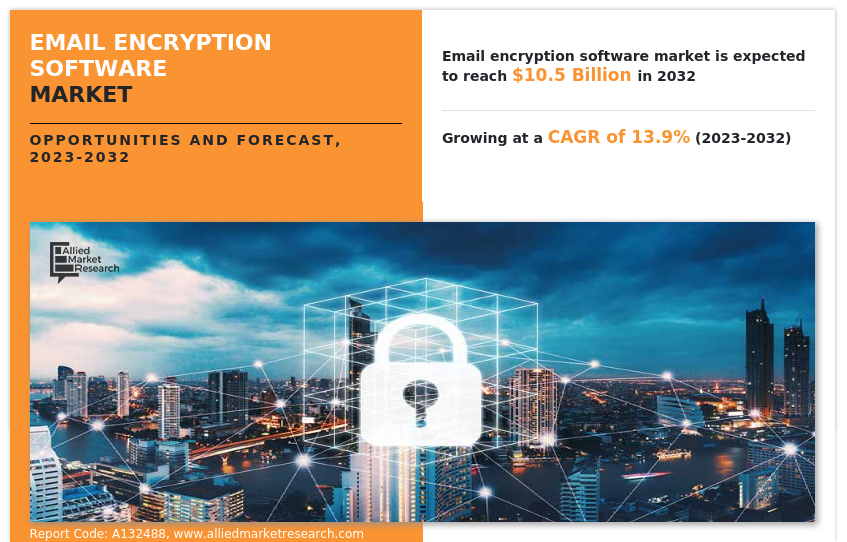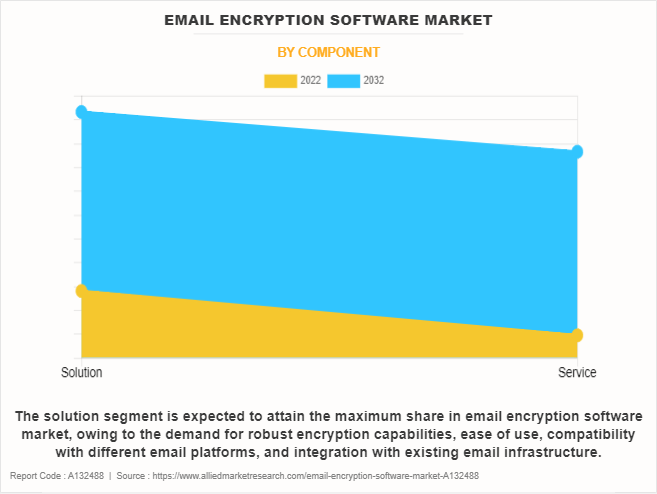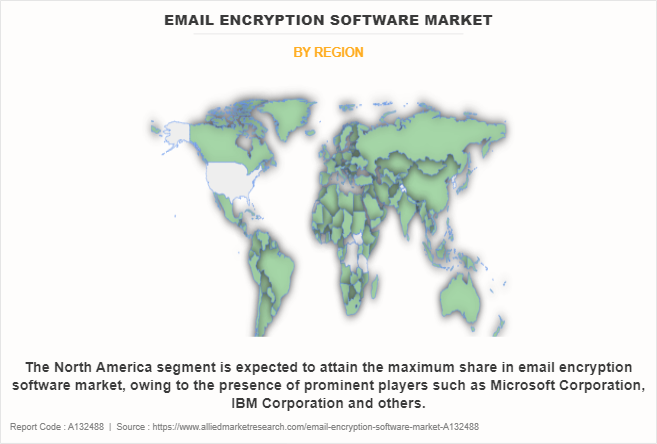Email Encryption Software Market Overview
The global email encryption software market size was valued at USD 2.9 billion in 2022, and is projected to reach USD 10.5 billion by 2032, growing at a CAGR of 13.9% from 2023 to 2032.
Email encryption software is a customized software application or tool designed to protect the content of email messages, attachments, and other communication data transmitted by email. It uses encryption algorithms to transform plain text data into a secure and unreadable form, known as ciphertext, making it inaccessible to unauthorized users. In addition, email encryption software assures the confidentiality of critical information by transforming the content into an unreadable format that can only be decrypted by the authorized user.

Moreover, integration of advanced computing technology to enable convenient platform for data encryption is also anticipated to create numerous opportunities for the global market growth. Moreover, rise in demand for effective communication mediums and increase in demand for mobile encryption solutions, propel the growth of the market. In addition, stringent data protection regulations and policies by government authorities drive the global market growth. However, the high cost of data security solutions and lack of knowledge and education about data security are expected to hamper the market growth. Furthermore, surge in technological advancements in encryption algorithms creates opportunities for the growth of the email encryption software market. Moreover, increase in the adoption of cloud-based data security solutions is expected to offer remunerative opportunities for the expansion of the global market during the forecast period.
Introduction
Email encryption software provides numerous benefits to the specific organization or consumers such as it prevents unauthorized access and protects against data breaches, safeguarding critical data such as financial data, personal details, intellectual property, and trade secrets. Moreover, it provides an additional layer of security to email communication, protecting it from interception or snooping by unauthorized users or malicious entities. In addition, the use of email encryption software market growth in different organizations allows ease of usage of security services and provides secure communication channels. Such enhanced factors are expected to provide lucrative opportunities for the market growth during the forecast period. In addition, increase in the number of cyber-attacks in different industries drives the need for effective data protection solution and increase in concern regarding data security is one of the major factors impacting the growth of the market. In addition, increasing adoption of internet devices and growing demand for flexible security services across businesses are expected to fuel the growth of the market during the forecast period.
The report focuses on growth prospects, restraints, and trends of email encryption software market analysis. The study provides Porter's five forces analysis to understand the impact of various factors, such as bargaining power of suppliers, competitive intensity of competitors, threat of new entrants, threat of substitutes, and bargaining power of buyers, on the email encryption software market.
Key Takeaways:
- By component, the solution segment accounted for the largest email encryption software market share in 2022.
- By deployment mode, the on-premise segment accounted for the largest email encryption software market share in 2022.
- By organization size, the large enterprises segment accounted for the largest email encryption software market share in 2022.
- By industry vertical, the BFSI segment accounted for the largest email encryption software market share in 2022.
- Region wise, North America generated the highest revenue in 2022.
Segment review
The email encryption software market is segmented into component, deployment mode, organization size, industry vertical, and region. By component, it is bifurcated into solution and service. By deployment mode, it is divided into on-premise and cloud. By organization size, it is categorized into large enterprises and small and medium-sized enterprises. By industry vertical, the market is classified into BFSI, IT and Telecom, retail and e-commerce, healthcare, manufacturing, government, energy & utilities, and others. Region-wise, it is analyzed across North America, Europe, Asia-Pacific, and LAMEA.

On the basis of component, the global email encryption software market share was dominated by the solution segment in 2022 and is expected to maintain its dominance in the upcoming years, owing to the rise in demand for intelligence solutions in several industries, which further expected to propel the global market growth. However, services are expected to exhibit the highest growth during the forecast period. Services in the email encryption software industry include a variety of products and services offered by businesses to help manage the encryption related activities, which drives the market growth for this segment in the global market.

By region, North America dominated the market share in 2022 for the email encryption software market. The presence of prominent players such as Microsoft Corporation, IBM Corporation and others is positively influencing the growth of email encryption software market in this region. However, Asia-Pacific is expected to exhibit the highest growth during the forecast period. This is attributed to the increase in integration of digital technologies and higher adoption of advanced technology, which is expected to provide lucrative growth opportunities for the market in this region.
Top Impacting Factors
Emphasis on cutting-edge technologies to enable encryption
The market for email encryption software is expanding significantly due to the increased focus on cutting-edge technology, which makes it possible to provide complex security features and capabilities that adapt to the changing needs of businesses. Modern technologies are used by encryption solutions to improve email messages' authenticity, confidentiality, and integrity. This helps to reduce concerns about data security and privacy. The acceptance of email encryption solutions is mostly driven by modern technology, which is demonstrated by the development of strong encryption algorithms and protocols that guarantee end-to-end protection of confidential data sent via email. Email text, attachments, and metadata are secured using advanced encryption technologies such as AES (Advanced Encryption Standard) and RSA (Rivest-Shamir-Adleman).
These technologies make it almost impossible for unauthorized parties to intercept or decrypt the encrypted data. Furthermore, proactive security measures and intelligent threat identification are made possible by the incorporation of machine learning and artificial intelligence (AI) into email encryption software. Through deployment of AI algorithms, organizations may avoid data breaches, phishing attacks, and other cyber threats before they become serious by analyzing email trends, detecting threats, and identifying potential security problems. This proactive approach to email security improves the overall efficacy of encryption solutions and fortifies the defenses against constantly changing cyberthreats owing to cutting-edge technology. Additionally, adopting cloud-based encryption solutions that are fueled by innovative technologies such as zero-trust architecture and blockchain provides scalable and flexible security measures that are specific to the dynamic nature of contemporary business environments.
High cost of data security solutions
The major challenge for the growth of the global email encryption software includes high implementation and maintenance costs. The initial expenses associated with implementing email encryption software generally relate to purchasing the program, setting up the infrastructure, and integrating it into current email systems. These costs can vary based on the size of the organization, the complexity of the infrastructure, and the level of modification required. In addition, email encryption software often comes with licensing or membership fees. These expenses can be recurring, such as monthly or annual subscriptions, or one-time expense for ongoing licenses. This increasing upfront installation costs restrains the adoption of email encryption software across the globe. Further, the integration of highly sophisticated technologies and components that provide efficient, reliable, and safe services are expected to enhance the market growth in the future.
However, these sophisticated technologies and equipment are expensive, and the design, development, and implementation of security systems involve high costs, which would be the major restraining factor for the growth of the global market. In addition, these technically advanced systems entail a combination of electronic components and several subsystems to offer real-time data to the business authority. It usually costs billions of dollars and more installation time as compared to the conventional system, which leads to less preference among security operators. Therefore, both the cost and time, which are required for the installation and development of encryption technologies in email encryption software are expected to be the major obstacles to the market growth across the globe.
Increased concerns regarding cyber security threats
Organizations seeking to strengthen their defenses and safeguard sensitive data from changing cyber threats have a great opportunity to leverage on the growing market for email encryption software. Businesses are realizing how important it is to secure email communications to prevent data breaches, unauthorized access, and other harmful actions, as cyber threats are growing more complex and widespread across industries.
Email encryption software companies are in a stronger position to offer cutting-edge solutions which address organizations primary security issues and reduce the risks caused by cyber threats due to the increased awareness of cybersecurity vulnerabilities. Robust encryption solutions are in high demand as cybercriminals use strategies such as ransomware, phishing attacks, and email spoofing to take advantage of weaknesses in email communication channels. By encrypting email content, attachments, and metadata, email encryption software gives businesses a proactive way to protect sensitive data, guaranteeing that information is kept private and secure while it is being transmitted. Offering comprehensive email encryption solutions that not only guard against known dangers but also foresee and combat upcoming cybersecurity threats through cutting-edge security features and technology provides an opportunity for businesses.
Email encryption is critical to a comprehensive cybersecurity plan due to the growing use of mobile devices and remote work in the workplace, which has increased the attack surface for cyberattacks. Offering adaptable and scalable solutions corresponding to the various communication requirements of remote workers provides an opportunity for email encryption software vendors, assuring safe email exchanges across various platforms, networks, and devices.
Key Market Players
Competitive analysis and profiles of the major players in the email encryption software market are Proofpoint Inc., BAE Systems, CipherMail B.V., Cisco Systems, Inc., Hewlett Packard Enterprise (HPE), Micro Focus International plc, Proton Technologies AG, Sophos Ltd., Trend Micro Incorporated, and Virtru. These major players have adopted various key development strategies such as business expansion, new product launches, and partnerships, which help to drive the growth of email encryption software market size globally.
Recent Developments in the Market
In April 2021, Broadcom collaborated with Google Cloud, under which Broadcom is expected to deliver its suite of security and enterprise operations software on Google Cloud, enabling businesses to deploy Broadcom solutions in security, DevOps, and more on Google Cloud global infrastructure. Similar strategies by the market players operating at a global and regional level are expected to help the market to witness significant growth during the forecast period.
Key Benefits for Stakeholders
This report provides a quantitative analysis of the market segments, current trends, estimations, and dynamics of the email encryption software market forecast from 2022 to 2032 to identify the prevailing market opportunities.
Market research is offered along with information related to key drivers, restraints, and opportunities of email encryption software market outlook.
Porter's five forces analysis highlights the potency of buyers and suppliers to enable stakeholders to make profit-oriented business decisions and strengthen their supplier-buyer network.
In-depth analysis of the email encryption software market segmentation assists in determining the prevailing email encryption software market opportunity.
Major countries in each region are mapped according to their revenue contribution to the global market.
Market player positioning facilitates benchmarking and provides a clear understanding of the present position of the market players.
The report includes an analysis of the regional as well as global email encryption software market trends, key players, market segments, application areas, and market growth strategies.
Email Encryption Software Market Report Highlights
| Aspects | Details |
| Market Size By 2032 | USD 10.5 billion |
| Growth Rate | CAGR of 13.9% |
| Forecast period | 2022 - 2032 |
| Report Pages | 339 |
| By Component |
|
| By Deployment Mode |
|
| By Organization Size |
|
| By Industry Vertical |
|
| By Region |
|
| Key Market Players | Sophos Ltd., CipherMail B.V., BAE Systems, Cisco Systems, Inc., Trend Micro Incorporated, Proton Technologies AG, Virtru, Micro Focus International plc, Hewlett Packard Enterprise (HPE), Proofpoint Inc. |
Analyst Review
As the email encryption software industry continues to evolve, CXOs are evaluating the opportunities and challenges regarding this emerging technology. CXOs acknowledge the significance of protecting confidential data transmitted over email, especially in industries such as banking and finance, healthcare, and government. CXOs are considering the benefits that email encryption software can offer, including the capability to provide an effective means to safeguard personal information, preserve legal compliance, and decrease the potential of data breaches and unauthorized access. In addition, implementing effective email encryption solutions helps CXOs maintain the privacy and authenticity of email communication, safeguarding their business reputation and avoiding potential legal and financial consequences. Such factors are expected to provide lucrative opportunities for the market growth during the forecast period.
Furthermore, email encryption software can enable essential risk management measures. By encrypting email content and attachments, organizations can minimize the risk of data loss, unauthorized access, and interception. However, CXOs also recognize the challenges associated with email encryption software. One potential risk is the complexity and usability challenges.
This software is complicated to deploy and use, which may require technical knowledge and additional processes to encrypt and decrypt data, making it challenging for organizations to enhance their product offerings in security services. In addition, email encryption software requires significant investment in security infrastructure and technological expenses, which can be a barrier to entry for small and medium-sized enterprises (SMEs).
Furthermore, interoperability issues between the network of devices must be addressed, as there could be incompatibilities between the encryption standards and protocols used by various email encryption software solutions. CXOs must integrate the software or applications based on specific standards and protocols.
By addressing these challenges, CXOs can unlock the full potential of email encryption software to transform their security operations, create value, and gain a competitive advantage in their industry. For instance, in January 2023, Micro Focus launched a new data center in the UK. Customers can access IT operations management (ITOM) software as a service (SaaS) solution from their local data center, which complies with local data residency regulations, including data security, privacy, storage and transfer.
Email encryption software provides numerous benefits to the specific organization or consumers such as it prevents unauthorized access and protects against data breaches, safeguarding critical data such as financial data, personal details, intellectual property, and trade secrets.
Email encryption software applications play a vital role in safeguarding sensitive information transmitted via email. These applications employ sophisticated encryption techniques to ensure that email contents remain secure and confidential, particularly in environments where data privacy and regulatory compliance are paramount.
North America is the largest regional market for Email Encryption Software.
10,491.57 is the estimated industry size of Email Encryption Software market.
Proofpoint Inc., BAE Systems, CipherMail B.V., Cisco Systems, Inc., Hewlett Packard Enterprise (HPE), Micro Focus International plc, Proton Technologies AG, Sophos Ltd., Trend Micro Incorporated, and Virtru are the top companies to hold the market share in Email Encryption Software.
Loading Table Of Content...
Loading Research Methodology...



